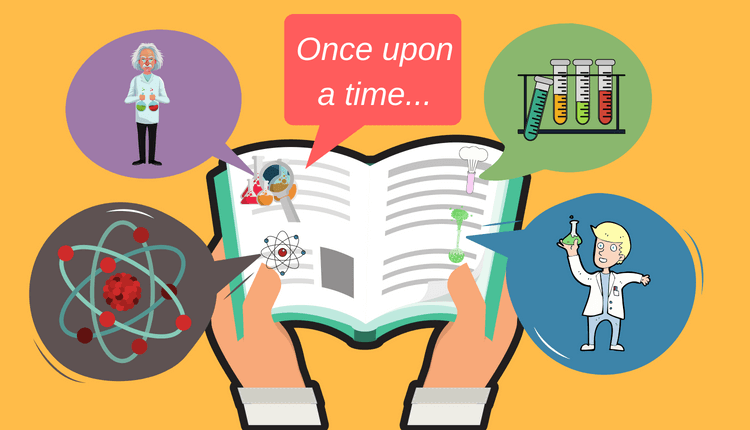Storytelling in Science: Communicate Your Research in Style

As children, we often have fond memories of enjoying a story at our bedside. Perhaps, we have pleasant memories of story time during our primary years of school. Even as adults, we enjoy curling up in the bed with a good book, to escape to another world, into the life of a character. The secret of our attachment to stories is that it stimulates our emotions. It is exciting to discover how the conflict gets resolved. However, is it possible to have storytelling in science? Ordinary scientific observations can be made interesting with the principal elements of story writing. Let us try to find out how.
What do Fiction and Science Have in Common?
Just as a fictional story can be enchanting, storytelling in science can also be enticing. Research papers written in a story-like fashion can be just as captivating. Every story has six key story elements: character(s), a setting, tension, action, climax, and a resolution. A research paper, written in the format of a story, has those same elements.
State the Purpose
While reading a story, we become entangled with the lives of the main characters. Although research papers do not have specific names or characters, they do have an objective or purpose. The researcher’s study objective is based on a variety of topics related to science. In stories, understanding the character is vital to understanding the reason he acts or thinks in a certain way. Similarly, in a research paper, the purpose has to be defined clearly for the reader to know the goal of the study. The purpose has to be clear so that the reader can easily follow.
Setting and Interest
The setting of a story is critical to understand a character’s background and personality. Likewise, in a science story, the setting gives background information for the reader. It is important for the reader to know and understand the details of the scientific research. Every reader enjoys a story that is clear, easy to follow and does not require a team of professionals to interpret the written text. Therefore, a writer of scientific stories should use language that is both simple and precise. The use of technical terms should also be limited.
To keep the readers glued to the study, it is vital to make the action of the research story clear. The action, or an unexpected spiral of your findings, can increase the readability of your research. As the information continues to build, readers will start to see how to solve the problems started. To conclude the scientific results in a research paper, it is critical for the story to have a climax. The climax includes conclusions based on the results of the research. The conclusion of a study is an important component that must be clear to the audience. It demonstrates that the research is credible.
Scientific Storytelling
The idea of storytelling in science is a perfectly reasonable way to approach to writing about scientific observations. Research is not all about charts and figures. Well-written research can be composed to create a captivating story. The words are impactful to the reader because they make the presented research more comprehensive. As a result, there is a story-like presentation that can capture the attention of children and adults. A truly captivating scientific research paper has the potential to challenge the creativity and writing ability of the researcher, and maintain the interest of the readers. While it may at first seem like a daunting task, scientific storytelling can be really interesting, both for the researchers and the readers.
Do you thing weaving a story around your research makes it more appealing to the masses? Please let us know your thoughts in the comments section below.










Thanks for this interesting post! Would be great if you could to a “How to …” blog as well. After reading this post I still do not know how to write a compelling science story.
Yes, indeed! I write an Eco Mysteries series for middle grades to inspire kids to become wise stewards of the Earth.